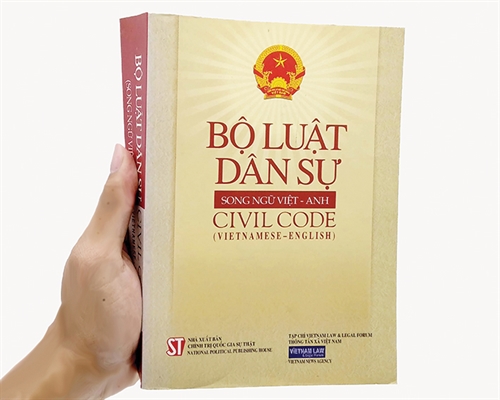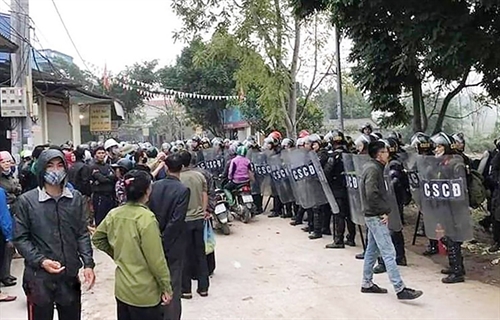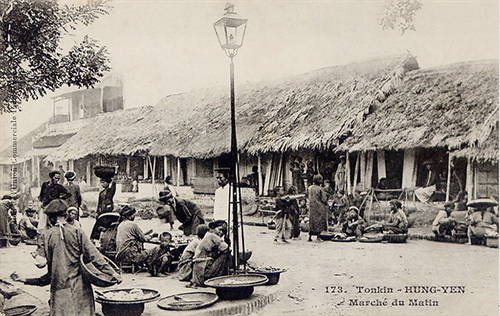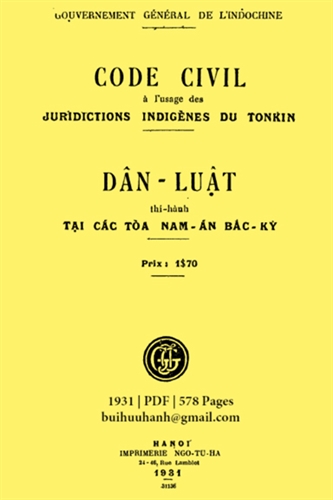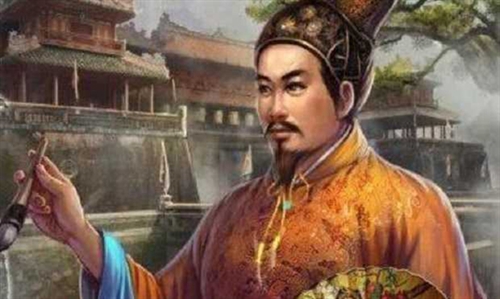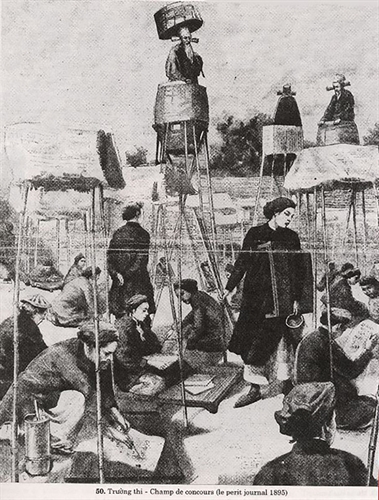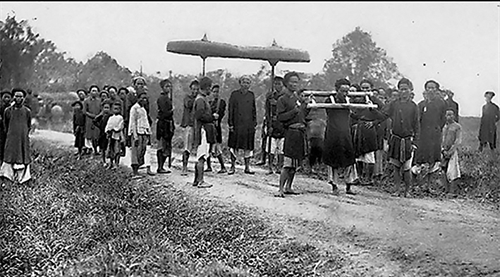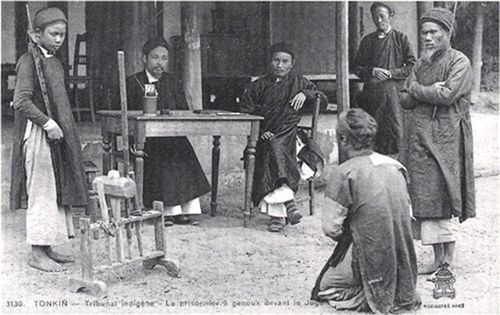Pham Thi Thu Hien, LL.D.
Administrative-State Law Faculty
Hanoi Law University
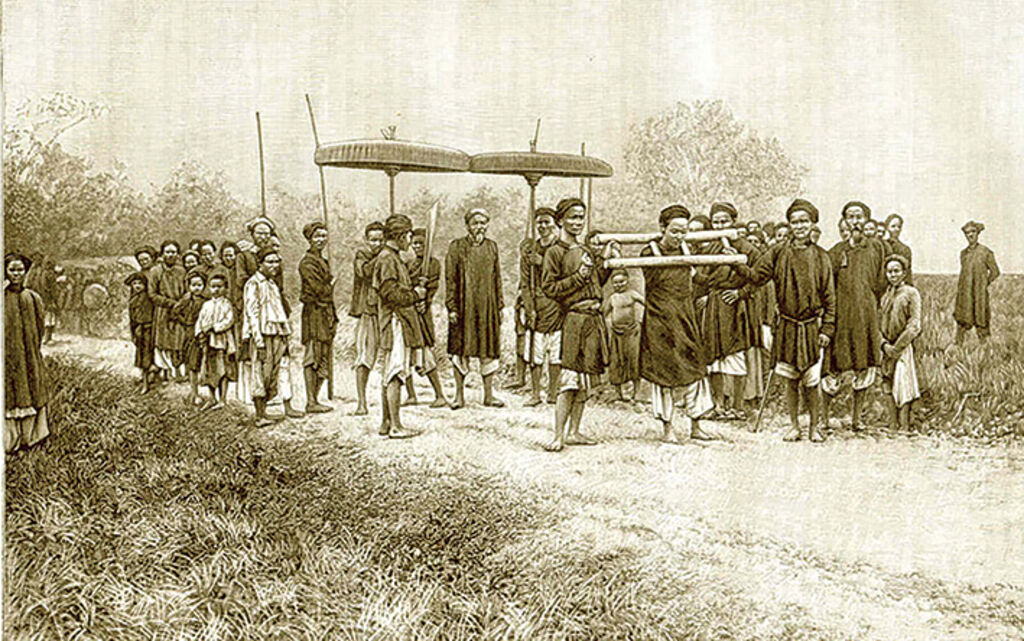 |
| A criminal is escorted to the execution ground__Photo: https://baophapluat.vn/ |
During the feudal time, crimes consistently drew the attention of kings who institutionalized the ideological principles of duc tri (virtue-based rule) and phap tri (law-based rule) to regulate the family, social and national relations. In order to promptly detect and strictly address crimes, Vietnamese feudal dynasties adopted different measures to prevent and combat crimes. These efforts contributed to fortifying the state apparatus and ensuring the effect of state laws and the stability of people’s lives.
Crime perception, classification and identification under Vietnam’s feudal law
Due to limitations in legislative techniques and the domination of Confucian ideas, Vietnam’s feudal law did not define crime and penalties clearly. Any act of infringing upon public land, which was considered the king’s land, and public assets was considered a criminal offense and would be penalized.
According to the two feudal codes, Quoc Trieu Hinh Luat (The Criminal Law of Royal Court) and Hoang Viet Luat Le (The Royal Laws and Regulations of Vietnam), crimes were classified in three ways.
- Penalty-based classification: During the feudal time, penalties were categorized into two groups: Ngu hinh (five criminal penalties) and penalties other than ngu hinh. Ngu hinh include xuy (whipping), truong (beating with a heavy stick), do (hard labor). luu (exile) and tu (capital punishment). Other penalties include biem (rank demotion), thich chu (tattooing on the forehead), and xung lam no ty (servant enslavement). This way of classification helped feudal judges select the penalties applicable to the accused.
- Classification based on offenders’ fault: Feudal lawmakers classified faults into intentional fault and unintentional fault, hence, intentional offenses and unintentional offenses. This way of classification helped judging mandarins determine offenders’ faults, thereby applying corresponding penalties.
- Classification based on importance of social relations (family, social and national relations). There existed Thap ac toi (ten crimes) and other crimes. Thap ac toi were defined in Article 2 of Quoc Trieu Hinh Luat and Hoang Viet Luat Le, including crimes of infringing upon the relations protected by Confucianism, namely the family, social and national relations.
Table 1: Thap ac toi (Ten Crimes or Abominations)
| Crime identification | Committed acts |
| Plotting rebellion | Attempts to endanger the society |
| Plotting great sedition | Attempts to damage or destroy royal temples, mausoleums, tombs or palaces |
| Plotting treason | Attempts to betray the country and defect to an enemy |
| Parricide | Beating and attempting to murder one’s own grandparents, parents, uncles, aunts, etc. |
| Depravity | Murdering three or more members of a family, murdering a person and cutting the victim’s body in pieces |
| Great irreverence | Stealing worshiping objects in mausoleums, temples; criticizing kings, etc. |
| Lack of filial piety | Maltreating, insulting grandparents, parents; telling a lie that grandparents, parents have died |
| Discord | Murdering or selling relatives of the three month-mourning or higher rank |
| Disloyalty | Murdering district mandarins, teachers, getting married or having entertainment after husband’s death |
| Incest | Having affairs with relatives |
Source: The History Institute, Vietnamese ancient law: Quoc Trieu Hinh Luat and Hoang Viet Luat Le, Education Publishing House.
Crimes other than Thap ac toi include crimes of infringing upon the king’s safety, quietness in the royal palace; crimes of breaking the public order, the state administration, and royal ceremonies; crimes of infringing upon the lives, health, honor and dignity of people; and crimes of infringing upon national security, social order and safety. Based on such classification, judges would know the relations, objects infringed upon and ways of imposing penalties. For Thap ac toi, the heaviest penalty would be capital punishment. For crimes other than Thap ac toi, corresponding penalties would apply.
At the same time, feudal lawmakers began to determine accomplices in crime commission. Article 36 of Quoc Trieu Hinh Luat provided that if among offenders of the same crime, the arrested person claimed the one who escaped was the gang leader but without enough evidence, the arrested person would be charged as accomplice. When the fleeing person was captured and claimed the arrested person was the gang leader, if it was true after the questioning, the arrested person would be charged as gang leader. According to Article 29 of Hoang Viet Luat Le, among the accomplices, a person who initiated the offense would be the chief culprit and penalized according to law, while the accomplices were penalized at one grade lower.
Generally, due to Confucian influence, the crimes prescribed by Vietnam’s feudal law were those related to family, society and nation. Signs of each type of crime were clearly defined in different articles and chapters, helping judging mandarins recognize and penalize them.
Causes of offenses
For crimes related to the national security, the king-subject relationship, and fellow-mandarins in the course of exercising the state power, the principal cause of crimes related to state secrets, royal powers, corruption, beating or murder of fellow-mandarins came from state policies.
The feudal state apparatus was organized and operated in adherence to the principle of “supreme royal power”. Therefore, a mandarin of the Nguyen dynasty assumed many positions, many roles as a politician, an intellectual, a loyal subject, an administrator, and a judge at a time. Such positions and roles under monarchies in general and the Nguyen dynasty in particular were established on the rank-based basis. Mandarins with high ranks, usually from the fourth rank upward, were always given preferential treatments from the state such as higher salaries, penalty reduction or exemption under Bat nghi cases[1] as prescribed in Article 3, volume II of Hoang Viet Luat Le.
Meanwhile, a number of public employees were given low or even no salaries. For instance, village chiefs and deputy-chiefs under the Nguyen dynasty were elected by villagers and had no salary. They were given small public land plots for cultivation as remuneration. However, according to a survey in 1805, the number of village officials who were not given public land accounted for 33.9 percent[2] in Ha Dong province, 56.3 percent in Thai Ninh district of Thai Binh province and 33.07 percent[3] in Tu Liem district (of present-day Hanoi). Hence, the system of different privileges constituted a loophole for corruption, negative practices, confederacy, etc., to emerge.
For the cause of social order-related crimes, most feudal dynasties in Vietnam were established in the wake of a civil war or national salvation war. Therefore, at the initial stage of a dynasty, people led an unstable and wandering life, which was often created an environment for to village tyrants’ manipulation, robberies or uprisings against the administration. According to the Nguyen dynasty’s historical records, in the period from 1802 to 1862, there were 390 uprisings (70 under King Gia Long, 230 under Minh Menh, 50 under Thieu Tri, and 40 under Tu Duc)[4], Tyrants appeared in Vietnamese villages during the 15th century, who appropriated land, state taxes, collected various tolls from inhabitants, forced girls to be concubines, etc.
Besides disasters, the state policies on tax and public labor pushed peasants into misery, hunger, famines, which gave rise to uprisings, robberies, duty evasions, etc.
For family relation-related crimes, the Vietnamese family regime, as ìnluenced by Confucianism, was characterized by patriarchy and polygamy, which gave prominence to the authority of patriarchs, parents, grandparents, husbands, and men, creating the submission in the relationship between grandparents, parents and children, between husbands and wives. The inequality in rights and obligations could lead to certain consequences in conducts between parents and children, between wives and husbands, or between brothers.
Measures to prevent and combat crimes during feudal time
Codifying moral rules
Confucian ceremonies and moral conception, including Ngu luan (five moral obligations between king and subject, father and child, husband and wife, brother and sister, and between friends) and Ngu thuong (five virtues: nhan (benevolence), nghia (righteousness), le (civility), tri (knowledge), and tin (loyalty), were institutionalized in law.
Vietnamese kings accepted Confucian moral conceptions and institutionalized Confucian ceremonies as well as Vietnamese moral standards, which were protected by law. This can be clearly seen in the two feudal codes: Quoc Trieu Hinh Luat of the Le dynasty and Hoang Viet Luat Le of the Nguyen dynasty.
Table 2: Number of volumes, articles on crimes in two feudal codes
| Quoc Trieu Hinh Luat | Hoang Viet Luat Le |
| - 47 articles on crimes of infringing upon the safety and peacefulness of the royal palace, and the safety of kings in the royal palace - 144 articles on crimes of breaking the ceremonial order, administrative management in various fields - 43 articles on crimes related to military affairs - 58 articles on crimes of infringing upon household registration, marriage and family - 69 articles on crimes related to land and tax - 10 articles on crimes related to adultery - 54 articles on robbery and theft - 50 articles on crimes of wounding people, beating family members, slander, etc - 38 articles on crimes related to fraudulences - 92 articles on other crimes | - Volume VI: 11 articles on crimes related to cheating on the number of village young men; 10 articles on theft, land mortgage and sale - Volume VII: 16 articles on crimes related to marriage - Volume VIII: 22 articles on crimes related to tax collection, budget and public property management; two articles on crimes related to tax evasion; three articles on lending; two articles on violations in trade transactions -Volume IX: six articles on rituals-related crimes, 17 articles on crimes related to public duty, the king, and mandarins’ responsibility - Volume X: 16 articles on crimes related to the protection of the king and royal palace; 20 articles related to military affairs - Volumes XII, XIII: 28 articles on crimes related to royal power, robbery and deception - Volume XIV: 19 articles on murder of relatives in marriage and family relation, murder of mandarins - Volume XV: 22 articles on fighting, causing injuries to teachers, mandarins, and people -Volume XVI: eight articles on violations of family, community and mandarin relations; 11 articles on adjudication and slander - Volume XVII: nine articles on bribe taking by mandarins; 11 articles on fraudulences in task performance - Volume XVIII: nine articles on breaking family order 11 articles on gambling, arson, non-compliance with orders |
Source: The History Institute, Vietnamese ancient law, Quoc Trieu Hinh Luat and Hoang Viet Luat Le.
Enhancing moral education and communication
The Nguyen dynasty paid great attention to education and training. Kings Gia Long and Minh Menh opened 109 Confucian schools in provinces and districts across the country. Quoc Tu Giam (Temple of Literature) was considered an education center located in the royal capital. Students were given many benefits by the State. Hence, Confucian intellectuals then were deeply imbued with Confucian morality and always fulfilled their obligations to the kings.
In addition, the kings issued decrees to admonish mandarins and commoners to follow Confucian morality and get rid of social evils.
Overseeing and giving preferential treatment to mandarins
The kings from the Ly dynasty promulgated regulations on examinations of mandarins’ capabilities and virtues for the purpose of rank promotion or demotion. However, the examination time varied from dynasty to dynasty, once every nine years in the Ly dynasty, 15 years[5] in the Tran dynasty, three years for preliminary examinations and six years for major examinations in the Le and Nguyen dynasties. On the basis of examination results, public officials were classified into different grades, for instance, four grades under King Minh Menh’s tenure: uu (outstanding); binh (fair), thu (without achievements or with achievements fewer than mistakes); liet (failure).[6]
The process of examinations with clear criteria under fair and objective assessment of feudal kings proved highly efficient in managing the contingent of mandarins.
In addition, from the Tran dynasty on, different agencies were set up by the State to oversee mandarins, such as Ngu Su Dai (in charge of personnel affairs in the bureaucratic system and juridical judgment), luc bo (six ministries), luc khoa (six departments overseeing six ministries, and Do sat vien which functioned to oversee mandarins from central to local level.
Moreover, the Le and Nguyen dynasties applied Hoi ty law in arranging the contingent of mandarins. This law provided that relatives such as brothers, fathers and sons, teachers and students, classmates, persons from the same native places, etc., were not allowed to work as mandarins at the same place, and that those who detected such cases had to report to the royal court and functional agencies for transfer to other places. This created the legal foundation to promote the fairness and objectivity in service of the royal court and to prevent and combat corruption.
Strictly handling violations
In order to effectively manage the contingent of public servants and suppress theft and robbery, village tyrants or peasants’ uprisings, the kings resorted to the penalties of xuy, truong, do, luu, tu and others.
Most corruption cases (168 out of 208 cases) in the feudal time were subject to criminal handling, with 40 percent of the corrupt mandarins subject to capital punishment. In addition, administrative and disciplinary measures, including wage reduction, bonus cut, rank demotion, dismissal, confiscation of property, and compensation for material evidence, were also applied to corruption cases.
In short, assorted crimes were institutionalized in Vietnamese feudal laws with clear definitions of criminal signs, classification as well as corresponding penalties. The Vietnamese dynasties adopted many preventive measures (administrative reform, education, institutionalization of morality into law, oversight etc.) as well as punitive measures (criminal or administrative) against crimes committed in all family, society and nation relations. These measures proved helpful for feudal rulers to detect and strictly handle violations and offenses.-
[1] Phan Huy Chu, Lich Trieu Hien Chuong loai chi (Chronicles of Past Dynasties), Social Science Publishing House, Hanoi, 1992, p. 692.
[2] The Nguyen dynasty’s cabinet, Thuan Hoa Publishing House, Hue, vol. 10, 1993, p. 554.
[3] Eight cases, including nghi than (close persons of the king, queen, queen’s mother and grandmother), nghi co (long-time servants of the king), nghi cong (persons with merits), nghi hien (virtuous persons), nghi nang (capable persons), nghi can (industrious persons), nghi quy (mandarins of second or higher ranks), nghi tan (children and grandchildren of the king’s guests) were considered for penalty reduction or exemption.
[4] Phan Huy Le, Vu Minh Giang: “Traditional values and contemporary Vietnamese, state scientific and technological research program KX-07, Subject KX07-02, 1996, p. 188.
[5] Philipp. Papin, Oliver Tessier, villages in the Red River delta - Issued left untouched, National Social Science and Humanity Center, 2002, p. 214.
[6] Vu Van Quan, On the cause of Vietnamese peasants’ uprisings in the first half of the 19th century in The Road of the 1995-2000 Historical Researches, National Political Publishing House, H.2000, p. 435.


